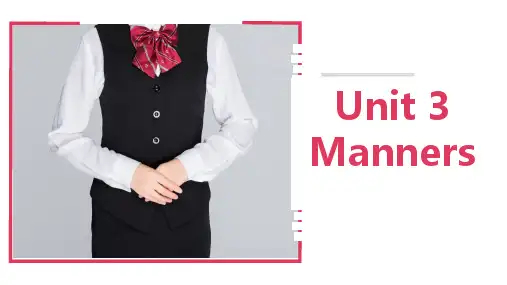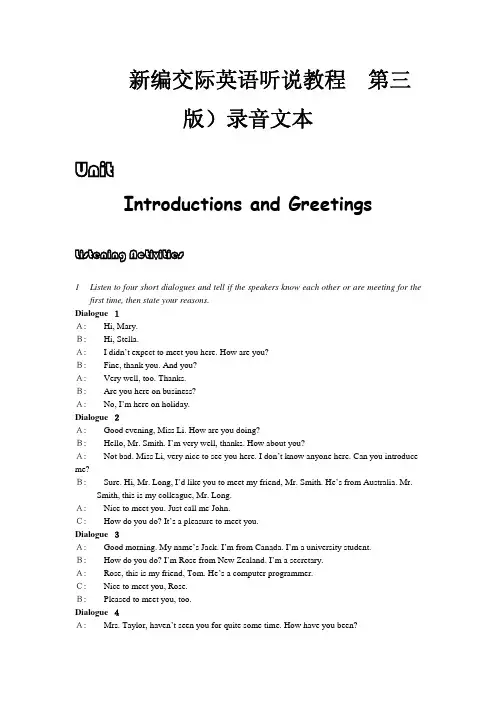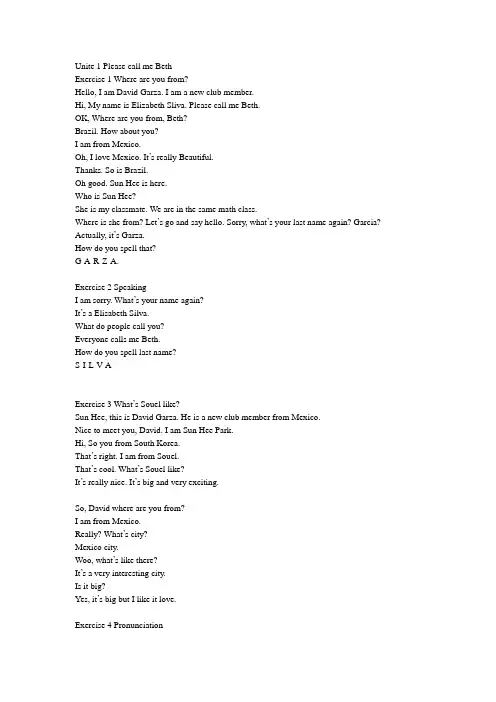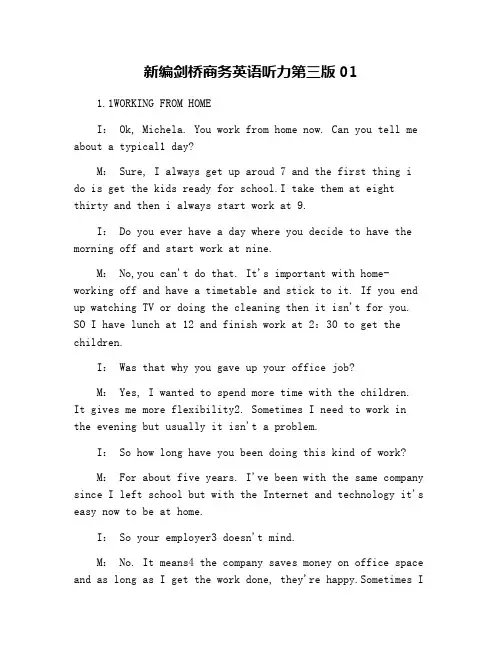致用英语听力(第三版)unit 1 Greetings and Introductions
Unit 1(英语听力教程第三版)

disconnected 6. clcultor: smll electronic device tht you use for doing mthemticl clcultions,
putting in telephone numbers, etc. 7. hunt round: look for 8. telephone directory: book listing the nmes, ddresses, nd telephone numbers of
the people nd businesses in prticulr re. 9. look up: serch for 10. hng on: continue witing
. You re going to her some recordings tht the telephone compny uses to tell you why you cll did not go through. Listen crefully nd write down ll the telephone
1. a. Mr. Rodgers, please.
c
b. I’ll call this afternoon.
c. This is Samuel Peterson.
2. a. Okay. I’ll call him right now.b
b. I’ll call him after lunch.
c. Okay. Lunch time is fine
致用英语听力第三册(第三版)Unit 3 Manners

( F ) 1. People in Malaysia eat with their left hand. ( F ) 2. People in the UK eat with their fingers and chew food with their
mouths closed.
( T) 3. In greeting, people in Malaysia shake hands and touch their chests. ( F ) 4. In greeting, people in the UK always kiss or hug each other
A Listening Practice
Pre-Listening Listen to the conversation and decide whether the following statements are true or false. Write T (true) or F (false) in the brackets.
文稿

新编交际英语听说教程(第三版)录音文本Unit 1Introductions and Greetings Listening Activities1Listen to four short dialogues and tell if the speakers know each other or are meeting for the first time, then state your reasons.Dialogue 1A: Hi, Mary.B: Hi, Stella.A: I didn’t expect to meet you here. How are you?B: Fine, thank you. And you?A: Very well, too. Thanks.B: Are you here on business?A: No, I’m here on holiday.Dialogue 2A: Good evening, Miss Li. How are you doing?B: Hello, Mr. Smith. I’m very well, thanks. How about you?A: Not bad. Miss Li, very nice to see you here. I don’t know anyone here. Can you introduce me?B: Sure. Hi, Mr. Long, I’d like you to meet my friend, Mr. Smith. He’s from Australia. Mr.Smith, this is my colleague, Mr. Long.A: Nice to meet you. Just call me John.C: How do you do? It’s a pleasure to meet you.Dialogue 3A: Good morning. My name’s Jack. I’m from Canada. I’m a university student.B: How do you do? I’m Rose from New Zealand. I’m a secretary.A: Rose, this is my friend, Tom. He’s a computer programmer.C: Nice to meet you, Rose.B: Pleased to meet you, too.Dialogue 4A: Mrs. Taylor, haven’t seen you for quite some time. How have you been?B: Fine, thanks. How about you, Mr. Shaw?A: Not very well. I’ve got a backache.B: Sorry to hear that. I hope you’ll be well soon.A: Thank you.2. Listen to three dialogues and tell where they take place.Dialogue 1A: Good morning. I’m Helen Brookes. I’d like to see your Personnel Manager, Mr. Gore. B: Good morning, Miss Brookes. Have you got an appointment with him?A: Yes.B: Please wait a minute. I’ll phone him and see if he’s there.A: OK.C: Hello.B: Hello, Mr. Gore. A Miss Brookes is here. She wants to see you.C: Ask her to come to my office. Thank you.B: Miss Brookes, Mr. Gore is expecting you in his office. Mr. Gore’s office is on the fifth floor, the second room on the right when you get out of the elevator. The elevator is over there.A: Thank you.B: Don’t mention it.Dialogue 2A: Excuse me, are you Miss Davies from Britain?B: Yes, I am. You’re...A: I’m Chen Hong from the Office of Foreign Affairs, Zhongshan University. I’m here to meet you.B: How do you do, Mr. Chen? Thank you for coming to meet me.A: You’re welcome. Miss Davis, did you have a good flight?B: I’m afraid not. I get jet lag whenever I travel to Asia from Britain.A: I’m sorry to hear that. Let me help you with your luggage.B: Oh, thank you. It’s very kind of you.Dialogue 3A: It seems I haven’t met you before. Are you new here?B: Yes. My name is Mary.A: I’m Robert. Pleased to meet you.B: Pleased to meet you, too.A: I’m glad we have a new colleague.B: It’s nice to have a chance to work with you.Practice for Consolidation1.Listening PracticeListen to the following two dialogues and complete the sentences.Dialogue 1A: Good morning, Lily. I didn’t expect to see you here in Guangzhou.How have you been lately?B: Pretty good, thank you. How about you?A: Not bad. Thanks.B: Janet, you don’t look very well.A: I’m feeling a bit unwell. I’ve got a slight cold.B: I’m sorry to hear that. Is it because of the bad weather here?A: I think so. It has been humid and foggy for the past few days.B: The weather in this season in Guangzhou always stays like this. People from other places find it hard to get used to this kind of weather. Anyway, Ihope you take good care of yourself and will be well soon.A: Thank you for your concern. Lily, why are you in Guangzhou?B: I’m now working here. I’m with Adidas, Guangzhou Office. How about you?A: We’re here to attend the trade fair. Lily, I’d like you to meet my colleague, Henry. Henry, this is my old friend, Lily.B: How do you do? Pleased to meet you.C: Nice to meet you, too. I hope you’re enjoying your stay in Guangzhou.Dialogue 2A: Excuse me, are you Mr. Morris from the United States?B: No, I’m not.A: Sorry, my mistake.B: That’s OK.A: Excuse me, you must be Mr. Morris from the United States.C: Yes, I am. You are...A: I’m Li Fang, secretary of Mr. Liu, who is too busy to be here to meet you in person. C: Miss Li, thank you for coming to meet me at the station.A: You’re welcome. Mr. Morris, did you have a good journey?C: Yes, very well. The train traveled very smoothly.A: Is this your first visit to China?C: Yes, it is. But I’ve heard a lot about China. It’s reported in newspapers that great changes have taken place in China. I’d like to see these changes with my own eyes.A: I hope you’ll have a good time in China.C: Thank you.A: Would you like me to carry this suitcase for you?C: Thank you. It’s very kind of you.A: Shall we go now? We’ll take a taxi outside.C: All right.。
剑桥国际英语教程第三版听力 Unit 1

Unite 1 Please call me BethExercise 1 Where are you from?Hello, I am David Garza. I am a new club member.Hi, My name is Elizabeth Sliva. Please call me Beth.OK, Where are you from, Beth?Brazil. How about you?I am from Mexico.Oh, I love Mexico. It’s really Beautiful.Thanks. So is Brazil.Oh good. Sun Hee is here.Who is Sun Hee?She is my classmate. We are in the same math class.Where is she from? Let’s go and say hello. Sorry, what’s your last name again? Garcia? Actually, it’s Garza.How do you spell that?G-A-R-Z-A.Exercise 2 SpeakingI am sorry. What’s your name again?It’s a Elisabeth Silva.What do people call you?Everyone calls me Beth.How do you spell last name?S-I-L-V-AExercise 3 What’s Souel like?Sun Hee, this is David Garza. He is a new club member from Mexico.Nice to meet you, David. I am Sun Hee Park.Hi, So you from South Korea.That’s right. I am from Souel.That’s cool. What’s Souel like?It’s really nice. It’s big and very exciting.So, David where are you from?I am from Mexico.Really? What’s city?Mexico city.Woo, what’s like there?It’s a very interesting city.Is it big?Yes, it’s big but I like it love.Exercise 4 PronunciationI am a new club member.Sun Hee is over there.My name is Elisabeth Silva.Excerise 5 Grammer focusI am from Mexico. You are from Brazil. He is from Japan.She is a new club member.It’s an exciting city.We are in the same class.They are my classmates.I’m=I am you’re=you are he’s=he is she’s=she is it’s=it is we’re=we are there’re=there areWh-questions with beWhat’s your name? My name is Beth.Where’s your friend? He is in class.Who’s Sun Hee? She is my classmate.What are your classmates like? They are very nice.Where are you and Loise from? We are from Brazil.How are your classes? They are really interesting.Exercise 7 How’s it going?Hi, David, how’s it going?Fine, thanks. How are you?Pretty good. So are your classes interesting this semester?Yes, they are. I really love chemistry.Chemistry? Are you and Beth in the same class?No, we are n’t. My class is in the morning. Her class is in the afternoon.Listen, I am on my way to the cafeteria now. Are you free?Sure, Let’s go.Exercise 8 Grammer FocusYes-No questions and showed answers with beAre you free? Yes, I am. No, I am not.Is David from Mexico? Yes he is. No he is not. No, he isn’t.Is that class in the morning? Yes, it is. No, it is not. No, it isn’t.Are you and Beth in the same class? Yes We are. No, we aren’t. No, we are not.Are classes interesting? Yes, they are. No, they are not. No, they aren’t.Exercise 10 Lestening What’s your last name again?John, this is my Friend Linda Tanaka. We are in the same English class.Hi Linda, I am Johnsonful Miller. Everyone calls me John.Nice to meet you, John. And what’s your last name again?It’s Miller. M-I-L-L-E-R.Where are you from, John?I am from here, United States. Actually Chicago. How do you like Chicago.I love it. It’s my favourite city.。
unit1 All about me 大学英语视听说第三版

An English Video Course 1 视听说教程(3rd Edition)电子教案 1
Listening Activity 1 Hi, I’m Fiona.
Language Notes Proper names
Fiona Miguel Hiromi Damen University of Canberra(澳大利亚)堪培拉大学 graphic artist 平面设计
May I introduce myself? Could I say a few words about myself? Allow me to say a bit about myself.
Giving your name:
My name is… It means… Call me… Everyone calls me…
Hiromi Miguel Fiona
Who … 6. is 28? 7. is a math teacher? 8. is a graphic artist? 9. studies computer science?
Hiromi Miguel
Fiona
√ √
√ √ √
• Level A: 5 sentences about yourself • Level B: 8 sentences about yourself • Level C: 12 sentences about
yourself
Unit
1
New Friends, New Faces
Lesson A Meeting new people Lesson B What does he look like?
新编剑桥商务英语听力第三版01

新编剑桥商务英语听力第三版011.1WORKING FROM HOMEI: Ok, Michela. You work from home now. Can you tell me about a typical1 day?M: Sure, I always get up aroud 7 and the first thing i do is get the kids ready for school.I take them at eight thirty and then i always start work at 9.I: Do you ever have a day where you decide to have the morning off and start work at nine.M: No,you can't do that. It's important with home-working off and have a timetable and stick to it. If you end up watching TV or doing the cleaning then it isn't for you. SO I have lunch at 12 and finish work at 2:30 to get the children.I: Was that why you gave up your office job?M: Yes, I wanted to spend more time with the children.It gives me more flexibility2. Sometimes I need to work in the evening but usually it isn't a problem.I: So how long have you been doing this kind of work?M: For about five years. I've been with the same company since I left school but with the Internet and technology it's easy now to be at home.I: So your employer3 doesn't mind.M: No. It means4 the company saves money on office space and as long as I get the work done, they're happy.Sometimes Istill go into work to meet clients5 and so on. For example, I'M going in nearly every day this week because we have visitors from another company and I can't really invite them overto my house. Besides, it's nice to go in every so often.I like to see people and catch up on the gossip6 and the news with my colleagues7. I miss that side of going into work every day.I: is there anything else you miss?M:ERMM,no, not really. And I'll tell you what I really don't miss and that's having to spend 2 hours commuting on the bus and train every day点击收听单词发音收听单词发音1 typical 5ltwoadj.典型的,象征的,有代表性的参考例句:This is typical Chinese English.这是典型的中式英语。
高等教育出版社英语听力教程第三版unitppt课件
Woman: Thank you.
5. Man 1: Hello, I want a __ca_b__.
*cab = taxi
Man 2: OK. What _a_d_d_r_e_s_s is it? Man 1: _1_1_2_0_ East __3_2_n_d_ Street.
*avenue: 大街、大道 *fire brigade:消防队
*to make or break social engagements: 预订或取消社会活动 *to do our shopping and ordering:购物或下订单 *save our feet and endless amounts of time:省去很多脚力和时间 *quick responses:快速应对
temporarily disconnected 暂时停机 changed to an unpublished number 更换号码(新号码是非 公开的)
Audioscript
Sometimes even when a telephone call goes through, the caller is still unable to speak to the person being called. Instead, the call might be answered by a machine. An answering machine answers calls with a tape recording, and many answering machines also allow the caller to record a message. It’s more efficient to leave your name and telephone number than to waste your time calling again and again.
致用英语听力教程1答案
致用英语听力教程1答案Listen This Way Book 1Unit 1 Can I Take a Message?Part I Getty readyPart II Giving and receiving phone callsPart III “I’d like to speak to…”Part IV More about the topic: A Birthday PresentPart V Memory test: “Oh, There’s a Phone.”Part VI Watch and enjoyPart I Getting readyTelephone is one of the most convenient and quickest ways of communication. We can use telephone to make or break social engagements, to do our shopping and ordering, and to obtain all kinds of information. Telephones can save our feet and endless amounts of time. But giving and receiving phone calls requires quick responses, and it is very important to get exact information from calls. To avoid misunderstandings, we should pay close attention to things like telephone numbers, times, dates, addresses, etc.*to make or break social engagements: 预订或取消社会活动*to do our shopping and ordering:购物或下订单*save our feet and endless amounts of time:省去很多脚力和时间*quick responses:快速应对A. The following words and phrases will appear in this unit. All of them are related to the telephone and some are frequently used when giving and receiving phone calls. Listen carefully and study the definitions.1.disconnected: 停机2.an unpublished number: 非公开号码3.answering machine: 电话答录机4.put through: 接通(电话)5.extension: 分机6.switchboard: 总机7.calculator: 计算器(有些计算器带储存电话号码的功能)8.telephone directory: 电话号码簿9.operator: 接线员10.hang up: 挂机rmation: 问询台12.exchange: 电话局B. Listen to part of a telephone conversation. Then choose the best response for each.1. a. Mr. Rodgers, please. b. I’ll call this afternoon. c. This is Samuel Peterson.2. a. Okay. I’ll call him right now. b. I’ll call him after lunch. c. Okay. Lunch time is fine.3.a. Yes. It’s 5345-4826 b. My name’s Craig Rice.c. My zip code is 200045.4.a. No. I'll call later. b. Yes. Go ahead. c.Yes. Please give me the message.5.a. I work for Tony. b. It’s spelled T-O-N-Y.c. That’s correct.6.a. Here’s the message. b. No. I’ll call later.c. Thank you.7.a. Okay. I’ll call her back later. b. Yes. I’ll meet her at 5:00. c. Sorry. I can’t meet her now.8.a. I’ll call him Monday morning. b. Allright. Please tell him Chris called.c. Have him call me on Monday at 9:00 a.m.9.a. Next Friday would be fine. b. Sorry. I’m busyon Wednesday at 6:00 p.m.c. Sure. No problem.10.a. Yes. I’ll call her later. b.No. Just tell herI called. C. Yes. Tomorrow is fine.C. Here are some short conversations on the phone. Please listenPay special attention to telephone numbers and addresses. Supply the missing words.1. Woman: Hello. Man: Hello. I want the County _________Woman: That’s_______. Man: Th ank you.2. Woman: Hello. Girl: ___________________, please.Woman: _________. Girl: What? Woman: I said _________. Girl: OK. Thank you.3. Woman: My husband’s broken his leg.Man: What’s your phone_________?Woman: Call just ______. The address is _____ Modern ______.Man: The _________ will be there in a few minutes.*ambulance: 救护车*in a few/five minutes: 几/五分钟之后,不是几/五分钟之内4. Woman: Hello, I’d like a______. Man: Yes? What is the _________?Woman: _____ Heath Road, Hamstit. Man: Oh, OK. The taxi will be there _________.Woman: Thank you.5.Man 1: Hello, I want a _____. Man 2: OK. What _______ is it?Man 1: _____ East ______ Street.Man 2: Ri ght*cab = taxi *avenue: 大街、大道*fire brigade:消防队6.Man: My house is on _____. Woman: Where do you _____? Man: ___ Alluson _______, Winderlon. Woman: Don’t _____. A fire ______ will be there in _____ minutes.7. Woman: Someone’s stolen my _____. Girl: Where are you calling _____?Woman: The Newton ______. Girl: The _______ will soon be there.Part II Giving and receiving phone callsMost of the time, when you dial a telephone number, your call goes through with no problem. Sometimes, however, you are not able to get through and the reason is given by a recorded message.*dial a telephone number: 拨打一个电话号码*a recorded message: 电话录音A. You are going to hear some recordings that the telephone company uses to tell you why your call did not go through. Listen carefully and write down all the telephone numbers you hear and the reasons why the calls did not go through.Sometimes even when a telephone call goes through, the caller is still unable to speak to the person being called. Instead, the call might be answered by a machine. An answering machine answers calls with a tape recording, and many answering machines also allow the caller to record a message. It’s more efficient to leave your name and telephone number than to waste your time calling again and again.*a tape recording: 主人预录在电话答录机上的话*to record a message: 客人在电话答录机上留言B. . You are going to hear several calls that are answered by machines. Listen to the recorded messages. Write down the reasons why each call is being answered by a machine instead of a person and the actions you decide to take. Write “W” for “wait on the line”, “L” for “leave a message”, and “C” for “call back later”.People usually receive telephone calls unexpectedly. Sometimes they have to make a note of the information contained in the call — particularly when the call is for someone else. Message taking is one of the most useful skills in dealing with telephone calls. A great deal of practice is needed in this respect.*message taking: 信息记录C1. You are going to hear some recorded phone calls. While listening for the first time, add more key words if you can in the left-hand column. After the second listening,complete the messages in the right-hand column with the help of the notes.。
剑桥国际英语教程第三版听力 Unit 1
Unite 1 Please call me BethExercise 1 Where are you from?Hello, I am David Garza. I am a new club member.Hi, My name is Elizabeth Sliva. Please call me Beth.OK, Where are you from, Beth?Brazil. How about you?I am from Mexico.Oh, I love Mexico. It’s really Beautiful.Thanks. So is Brazil.Oh good. Sun Hee is here.Who is Sun Hee?She is my classmate. We are in the same math class.Where is she from? Let’s go and say hello. Sorry, what’s your last name again? Garcia? Actually, it’s Garza.How do you spell that?G-A-R-Z-A.Exercise 2 SpeakingI am sorry. What’s your name again?It’s a Elisabeth Silva.What do people call you?Everyone calls me Beth.How do you spell last name?S-I-L-V-AExercise 3 What’s Souel like?Sun Hee, this is David Garza. He is a new club member from Mexico.Nice to meet you, David. I am Sun Hee Park.Hi, So you from South Korea.That’s right. I am from Souel.That’s cool. What’s Souel like?It’s really nice. It’s big and very exciting.So, David where are you from?I am from Mexico.Really? What’s city?Mexico city.Woo, what’s like there?It’s a very interesting city.Is it big?Yes, it’s big but I like it love.Exercise 4 PronunciationI am a new club member.Sun Hee is over there.My name is Elisabeth Silva.Excerise 5 Grammer focusI am from Mexico. You are from Brazil. He is from Japan.She is a new club member.It’s an exciting city.We are in the same class.They are my classmates.I’m=I am you’re=you are he’s=he is she’s=she is it’s=it is we’re=we are there’re=there areWh-questions with beWhat’s your name? My name is Beth.Where’s your friend? He is in class.Who’s Sun Hee? She is my classmate.What are your classmates like? They are very nice.Where are you and Loise from? We are from Brazil.How are your classes? They are really interesting.Exercise 7 How’s it going?Hi, David, how’s it going?Fine, thanks. How are you?Pretty good. So are your classes interesting this semester?Yes, they are. I really love chemistry.Chemistry? Are you and Beth in the same class?No, we are n’t. My class is in the morning. Her class is in the afternoon.Listen, I am on my way to the cafeteria now. Are you free?Sure, Let’s go.Exercise 8 Grammer FocusYes-No questions and showed answers with beAre you free? Yes, I am. No, I am not.Is David from Mexico? Yes he is. No he is not. No, he isn’t.Is that class in the morning? Yes, it is. No, it is not. No, it isn’t.Are you and Beth in the same class? Yes We are. No, we aren’t. No, we are not.Are classes interesting? Yes, they are. No, they are not. No, they aren’t.Exercise 10 Lestening What’s your last name again?John, this is my Friend Linda Tanaka. We are in the same English class.Hi Linda, I am Johnsonful Miller. Everyone calls me John.Nice to meet you, John. And what’s your last name again?It’s Miller. M-I-L-L-E-R.Where are you from, John?I am from here, United States. Actually Chicago. How do you like Chicago.I love it. It’s my favourite city.。
Unit 1 英语听力教程第三版
Part Two C
•From: Jeremy •Message: Harold Scott is retiring at the end of the month. There will be a job going for him.
Part Two C
•From: Ted •Message: He couldn’t get the red ones, but there are plenty of blue. You can see them any time.
Part Two A
• 3582818 disconnected • 4912386 temporarily out of order • 5240034/7828249 number changed • 2650325 temporarily disconnected • 3587202 changed to an unpublished number
Phone Turned off
•Sorry! The subscriber you dialed is power off.
Unpublished Number
•Sorry! The number you dialed does not exist, please check it and dial later.
Not in Service Area
•Sorry!The subscriber you dialed can not be connected for the moment, please redial later.
Phone in Debt
•Sorry, your telephone charge is overdue, please renew it, thank you!
- 1、下载文档前请自行甄别文档内容的完整性,平台不提供额外的编辑、内容补充、找答案等附加服务。
- 2、"仅部分预览"的文档,不可在线预览部分如存在完整性等问题,可反馈申请退款(可完整预览的文档不适用该条件!)。
- 3、如文档侵犯您的权益,请联系客服反馈,我们会尽快为您处理(人工客服工作时间:9:00-18:30)。
Part B Listening Practice
Pre-Listening Divide into groups and have a discussion on the following questions. 1.What do you often say when you greet your friends? 2.Do you think people in English- speaking countries greet each other the same way as we Chinese do?
My name’s John. I come from Hong Kong. I am glad to study chemistry here.
I come from California.
And this is my cousin Emily.
She’s from Michigan.
We are both in the English Department.
Part A Listening Skills
Task 1 Listen and complete the following dialogues. Dialogue2 A: Hello, I’m Sally. Glad to meet you. B:Hello, Sally. My name’s__A__m_y__. Where are you from? A:I’m from Singapore. And this is my __c_o_u_s_in__ Irene . She’s in the same___d_e_p_ar_t_m_e_n_t___ with us. C:Hi,__A_m_y__. B:Pleased to meet you, Irene
Part B Core Listening
Task 1 Listen to the statements and choose the best response to what you hear. Key: D A D B
Part B Core Listening
Task 1 Listen to the statements and choose the best response to what you hear. 1. George, I’d like you to meet Simon. 2. Nice weather, isn’t it? 3. Good afternoon. 4. Let’s get to know each other. Why don’t we say a little bit of ourselves?
Part B Core Listening
Task 3 Listen to the monologue and answer the following questions. I was billions of dollars in debt. But I fought back and I won. I used my brain, I used my negotiation skills, and I worked it all out. Now my company’s bigger than it ever was, it’s stronger than it ever was, and I’m having more fun than I ever had.
Part B Core Listening
Task 3 Listen to the monologue and answer the following questions. I’ve mastered the art of the deal, and I’ve turned the name Trump into a brand of the highest quality. And as the master, I want to pass along my knowledge to somebody else. I’m looking for the apprentice.
Task 2 Listen to the statements and match the information you hear by drawing lines between the columns.
1. My name’s Raymond.
3. Hey, everyone.
I live in Long Island. I am here to study journalism. 2. Hello, I’m Sarah.
Unit 1 Greetings & Introductions
Part A Listening Skills
Task 1 Listen and complete the following dialogues. Dialogue1 A:Hi,Michael,______h_o_w_’_s _it_g_o_i_n_g_____? B:Pretty good. How are you__d_o_i_n_g__,__S__am____? A:_____N_o_t_b_a_d_____,thanks.
Part B Core Listening
Task 3 Listen to the monologue and answer the following questions. My name is Donald Trump, and I’m the largest real estate developer in New York. I own buildings all over the place, model agencies, jet liners, golf courses, casinos, and private resorts. But it wasn’t so easy. About thirteen years ago, I was seriously in trouble.
Part B Core Listening
Task 3 Listen to the monologue and answer the following questions. Right now all over the country, sixteen of America’s best and young entrepreneurs are arriving in New York for the chance to work as my apprentice and get a first-hand look into the world of big business. They come from all walks of life.
Part A Listening Skills
Task 2 Listen to the statements and match the information you hear by drawing lines between the columns.
Part A Listening Skills
Part B Core Listening
Task 3 Listen to the monologue and answer the following questions. Key: 1. largest New York 2. billions of dollars in debt 3. sixteen
Part A Listening Skills
Task 1 Listen and complete the following dialogues. Dialogue 3
A:Professor Smith, I’d like to __i_n_t_ro_d_u_c_e__ Allen to you. This is my _r_o_o_m_m__a_te_ ,Allen. And Allen, this is my _____E_n_g_li_s_h_t_e_a_ch_e_r_____, Professor Smith. B: How do you do, Professor Smith? Henry always tells me that he enjoys your __c_la_s_s_es__ very much. It’s my great pleasure to meet you. C:Nice to meet you, Allen. So are you an __E_n_g_l_is_h__ major, too? B: No, I major in____c_o_m_p_u_t_e_r___ science. But I like English a lot.
Part B Core Listening
Task 2 Listen to the dialogue and answer the following questions. 1. She wants to apply for a student ID. 2. No, she can’t. Because she needs to get registered first,
Part A Listening Skills
Task 3 Listen and underline the words you hear in each of the following pairs.
Part A Listening Skills
Task 3 Listen and underline the words you hear in each of the following pairs.
Part B Core Listening
Task 3 Listen to the monologue and answer the following questions. This is the chance to work for me for a huge salary and more importantly learn enough so that maybe they too
